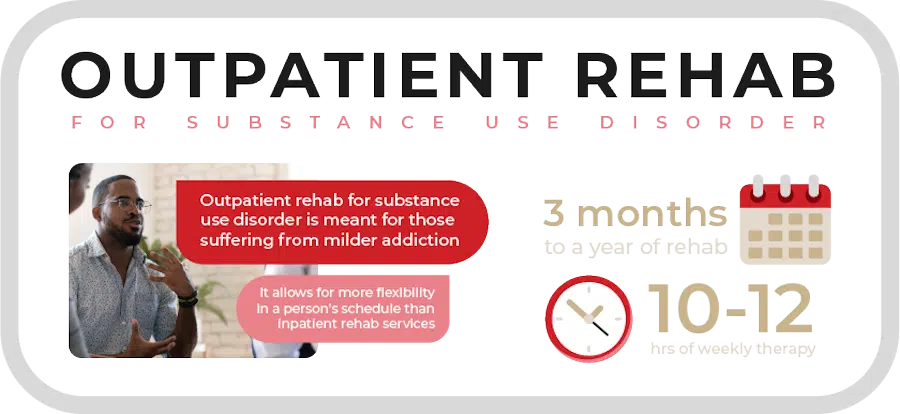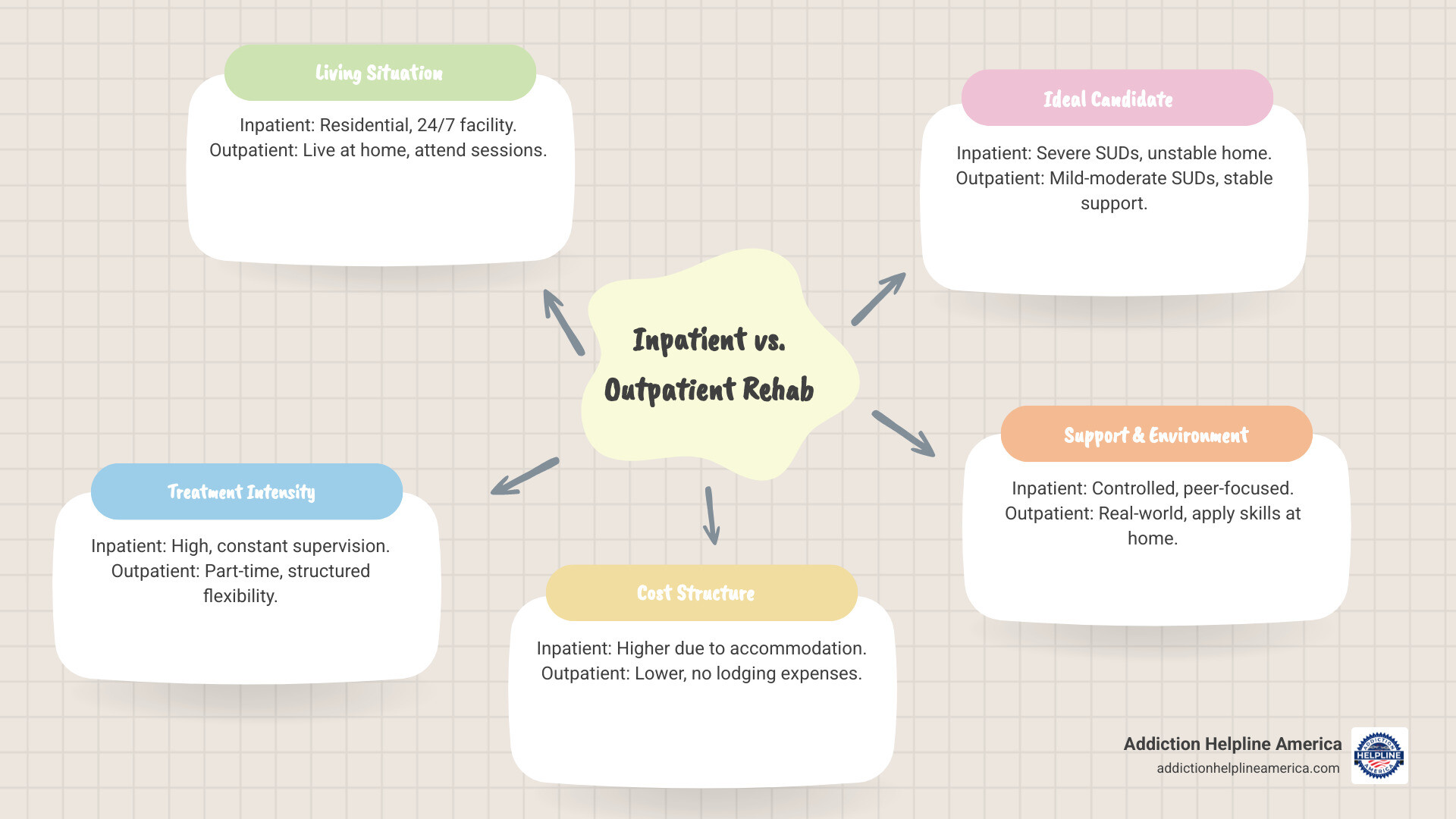
Understanding Your Options for Outpatient Drug Rehab
Outpatient drug rehab is a form of addiction treatment that allows you to receive professional care while living at home and maintaining your daily responsibilities. Unlike inpatient programs, which require residing at a facility, outpatient rehab involves attending scheduled therapy sessions and support services several times per week.
Key Features of Outpatient Drug Rehab:
- Flexibility: Continue work or school with evening or weekend sessions.
- Lower Cost: More affordable than residential care as it excludes accommodation expenses.
- Real-World Recovery: Practice new skills in your home environment.
- Multiple Levels of Care: Includes Partial Hospitalization (PHP), Intensive Outpatient (IOP), and Standard Outpatient programs.
- Comprehensive Services: Access to individual and group therapy, medication-assisted treatment, and family support.
Outpatient programs are ideal for individuals with mild to moderate substance use disorders who have a stable home life and strong motivation. They are also a common step-down option after completing inpatient treatment.
At Addiction Helpline America, we help individuals and families steer outpatient drug rehab options, connecting them with programs that fit their unique needs. Our team provides confidential, personalized guidance 24/7 to help you make an informed decision for your recovery journey.
Outpatient drug rehab terms at a glance:
Understanding the Different Levels of Outpatient Drug Rehab
Choosing between inpatient and outpatient drug rehab is a major decision, and even within outpatient care, there are different levels of intensity. At Addiction Helpline America, we help people steer these choices daily, and we know it can feel overwhelming.
Outpatient vs. Inpatient Care: Making the Right Choice
The primary difference between inpatient and outpatient drug rehab is the living situation and intensity of care. Inpatient rehab (residential treatment) involves staying at a facility full-time, providing 24/7 medical and emotional support in a structured environment away from daily triggers. This is often best for severe substance use disorders or for those who need a complete break from their environment to focus on recovery. However, inpatient care costs more due to accommodation and round-the-clock supervision.
Outpatient drug rehab allows you to live at home while attending scheduled treatment sessions. This flexibility means you can continue with work, school, and family life. It’s generally more affordable and works well for individuals with mild to moderate substance use disorders and a supportive home environment. It’s also a common next step for those transitioning from inpatient care.
The right choice depends on your specific needs. This table clarifies the differences:
| Factor | Inpatient Rehab | Outpatient Rehab |
|---|---|---|
| Living Situation | Resides at the treatment facility 24/7 | Lives at home or in a sober living facility |
| Intensity | High; 24/7 medical and therapeutic support | Moderate to low; Scheduled sessions several times/week |
| Cost | Higher; Includes accommodation and round-the-clock care | Lower; No accommodation costs |
| Ideal Candidate | Severe SUDs, unstable home environment, co-occurring disorders, high relapse risk | Mild to moderate SUDs, stable home environment, strong support, need for flexibility |
| Support Level | Constant supervision and structured environment | Scheduled support, requires self-discipline, real-world application of skills |
Because outpatient drug rehab doesn’t include room and board, it’s often more accessible financially. This affordability can allow for a longer treatment duration, which research shows can improve long-term outcomes. If you’re concerned about expenses, our guide on the cost of rehab breaks down what to expect.
Types of Outpatient Programs: From PHP to Standard Care
Outpatient drug rehab is a spectrum of programs with varying intensities. A comprehensive assessment determines the right level of care for your situation.
Partial Hospitalization Programs (PHP) are the most intensive outpatient option, requiring 20 or more hours of treatment each week. The clinical intensity is similar to inpatient care, but you return home each evening. PHPs are often a step-down from residential treatment or an entry point for those needing significant support without 24/7 supervision. Our PHP Program Costa Mesa Complete Guide offers more detail.
Intensive Outpatient Programs (IOP) are a middle ground, involving 9 to 20 hours of treatment per week. This schedule allows you to balance treatment with work or school while receiving substantial support. IOPs focus on relapse prevention and developing coping skills, often serving as a transition from a PHP in the step-down care process.
Standard Outpatient Programs (OP) are the least intensive, with fewer than 9 hours of treatment per week. These highly flexible programs are suited for people with milder SUDs or those in long-term recovery maintenance, emphasizing continuing care through ongoing counseling and support. For more on the full range of options, visit our information on addiction treatment page.
This continuum allows you to move between levels of care as your needs change, ensuring your treatment plan remains effective.
Is Outpatient Rehab Right for You?
Outpatient drug rehab can be an excellent fit if you have a mild to moderate substance use disorder and are not at risk for dangerous withdrawal. A strong support system and a stable, safe home environment are crucial for success. Because there is no 24/7 supervision, high motivation and self-discipline are essential for attending sessions and applying what you learn.
The flexibility to maintain work or school is a deciding factor for many. Evening and weekend sessions are often available to accommodate daily obligations.
However, there are challenges. You will face real-world triggers daily and lack immediate, round-the-clock clinical support. Success requires strong coping skills, a solid relapse prevention plan, and practical considerations like reliable transportation.
Determining if outpatient care is right for you requires a professional assessment. At Addiction Helpline America, we provide free, confidential guidance to help you understand your options and connect with a program that fits your needs.
Core Services and Therapies in Outpatient Treatment
An outpatient drug rehab program provides comprehensive, evidence-based care designed to address all facets of addiction while you continue your daily life. Treatment focuses not just on stopping substance use, but on building healthier coping mechanisms and a fulfilling, sober life.
Evidence-Based Therapies for Addiction Recovery
The core of any effective outpatient drug rehab program is its therapeutic approach. These are structured, proven interventions that help you change how you think, feel, and respond to challenges.
- Individual Counseling: One-on-one sessions to explore personal issues driving substance use, such as trauma or stress, and develop customized coping strategies.
- Group Therapy: A supportive environment to share experiences with peers, learn from others, and practice new interpersonal skills.
- Family Therapy: Helps repair relationships by improving communication and teaching loved ones how to support recovery effectively.
- Cognitive-Behavioral Therapy (CBT): A highly effective approach that teaches you to identify, challenge, and replace negative thought patterns that lead to substance use. Learn more about therapy in addiction recovery.
- Dialectical Behavior Therapy (DBT): Teaches skills in mindfulness, emotional regulation, distress tolerance, and interpersonal effectiveness, which is especially helpful for co-occurring conditions.
- The Matrix Model: A comprehensive, structured approach for stimulant addiction that combines behavioral therapy, family education, counseling, and 12-step facilitation.
- Motivational Improvement Therapy (MET): Helps resolve ambivalence about treatment by guiding you to find your own internal motivation for change.
- Support Groups and 12-Step Facilitation: Programs like Alcoholics Anonymous and Narcotics Anonymous provide peer support, accountability, and a structured path to recovery.
These therapies work together to address the root causes of addiction and build a strong foundation for long-term sobriety.
The Role of Medication-Assisted Treatment (MAT) in Outpatient Drug Rehab
Medication-Assisted Treatment (MAT) is an evidence-based approach that combines FDA-approved medications with counseling and behavioral therapies. It is not “replacing one drug with another\” but a proven method for treating opioid and alcohol use disorders.
MAT works by addressing the physical side of addiction while you do the psychological work in therapy. Medications help reduce cravings, manage withdrawal symptoms, and prevent relapse by stabilizing brain chemistry. This makes the detox process safer and more comfortable, as detailed in our guide on the stages of detox.
- For opioid use disorder, medications include Buprenorphine (reduces cravings), Methadone (prevents withdrawal), and Naltrexone (blocks euphoric effects).
- For alcohol use disorder, options include Acamprosate (reduces cravings), Disulfiram (creates an unpleasant reaction to alcohol), and Naltrexone (reduces the pleasurable effects of drinking). For more on this topic, see our page on alcohol related issues.
Integrating MAT into outpatient drug rehab allows you to receive this life-saving treatment while maintaining your daily life. The medication provides physical stability, allowing you to fully engage in the therapeutic work of recovery. This combined approach consistently leads to better outcomes than either method used alone.
Navigating the Cost and Process of Outpatient Rehab
Financial concerns are a common barrier to seeking help, but many options exist to make outpatient drug rehab accessible. At Addiction Helpline America, we help people understand these options every day.
Understanding the Cost of Outpatient Treatment
The cost of outpatient drug rehab varies based on program type (PHP, IOP, OP), location, services offered, and treatment duration. However, it is significantly more affordable than inpatient treatment because it doesn’t include costs for accommodation, meals, or 24/7 staffing. While total costs vary, they can range from approximately $2,000 to $5,500 for a 1-3 month program. For a detailed breakdown, see our guide on the cost of rehab.
Several payment options are available:
- Private Insurance: The Affordable Care Act (ACA) mandates that most health insurance plans cover substance use services. Contact your provider to understand your specific benefits, deductibles, and co-pays.
- Medicaid and Medicare: These government-funded programs often cover outpatient drug rehab services for eligible individuals.
- State-Funded Programs: Many states offer grants and publicly funded programs for those with limited financial resources. For example, Washington State uses funds like the SAPT Block Grant to support these services, as noted in its Substance use disorder outpatient treatment and residential services fact sheet (2025).
- Private Pay and Financing: Many facilities offer payment plans, work with third-party lenders, or provide sliding scale fees based on income to make treatment manageable.
How to Find an Outpatient Drug Rehab Program Near You
Finding the right outpatient drug rehab program can be a straightforward process with the right support.
First, consult a doctor or healthcare provider. They can offer a professional assessment and refer you to local treatment centers. Our guide on how to get into rehab provides a comprehensive overview of this process.
Next, use online directories and treatment locators to search for programs by location, services, and insurance. You can also contact your insurance provider directly for a list of in-network facilities, which is crucial for understanding your financial responsibility.
Finally, contacting a helpline like ours provides confidential, personalized recommendations. The team at Addiction Helpline America is available 24/7 to connect you with programs from our vast network across all 50 states and the District of Columbia. We match you with options based on your specific needs, location, and budget. For localized searches, check out our Outpatient Rehab Near Me Complete Guide.
We are here to help you steer this journey and find the support you deserve.
Life After Treatment: Relapse Prevention and Continuing Care
Completing an outpatient drug rehab program is a major achievement, but recovery is an ongoing journey. Viewing addiction as a chronic condition, like diabetes, helps frame the need for continuous management and care.
Relapse is Not Failure; It’s a Call for Adjustment
A relapse after outpatient drug rehab does not mean you or the treatment failed. It’s a sign that your recovery plan needs adjustment. The chronic nature of addiction means setbacks can happen, and they are opportunities to identify new triggers, strengthen coping skills, and deepen your commitment to recovery.
Developing a relapse prevention plan is a vital part of treatment. This roadmap involves:
- Identifying personal triggers: Pinpointing the people, places, situations, or emotions that lead to cravings.
- Building coping skills: Using techniques from therapy like mindfulness, distraction, or reaching out to your support network.
- Creating an emergency strategy: Knowing exactly who to call and what to do when cravings feel overwhelming. Cravings are temporary, and our page on how long do cravings last offers perspective on managing them.
Continuing Care: Your Long-Term Recovery Strategy
Transitioning from a structured outpatient drug rehab program requires a solid continuing care plan to keep you supported and accountable.
- Sober Living Homes: These residences offer a structured, supportive environment for those whose home life may not be stable, providing a bridge while you continue aftercare.
- Alumni Programs: Many treatment centers offer programs to keep you connected to a community of peers through events, workshops, and mentoring.
- Ongoing Therapy: Continuing with individual or group therapy provides a professional touchpoint to help you steer new life challenges.
- Support Groups: Peer-led communities like Alcoholics Anonymous or Narcotics Anonymous offer unconditional understanding, accountability, and a sense of belonging that can anchor your recovery.
- Building a Support Network: Cultivating strong relationships with family, friends, and sober peers reduces isolation and provides a foundation for lasting recovery.
Recovery is about creating a life so meaningful that substances no longer have a place. When challenges arise, professional help is always available. Addiction Helpline America is here to help you find resources and support you through every phase of your journey.
Frequently Asked Questions about Outpatient Rehab
We understand you have questions about outpatient drug rehab. Here are answers to some of the most common inquiries.
How long does outpatient rehab last?
The duration of outpatient drug rehab is not fixed; it is customized to your individual needs and progress. Programs can last from a few months (e.g., 3-6 months) to over a year for more complex cases. The timeline depends on the severity of the SUD, progress in treatment, co-occurring conditions, and relapse history. The goal is to provide steady support for lasting recovery. For information on different program lengths, our guide on 30 day rehab offers another perspective.
What are the main benefits of outpatient rehab?
Outpatient drug rehab offers several key advantages:
- Flexibility: Programs are designed around your schedule, allowing you to maintain work, school, and family commitments.
- Lower Cost: It is more affordable than inpatient care because it excludes residential expenses.
- Home Support System: You can remain connected to your family and friends, integrating them into your recovery.
- Real-time Application of Skills: You can immediately practice coping strategies learned in therapy in your daily environment.
- Privacy: It allows you to receive treatment discreetly without major disruptions to your public or professional life.
Can you detox in an outpatient setting?
Yes, outpatient detox is a safe option for individuals with mild to moderate withdrawal symptoms. It involves regular visits to a facility for medical check-ups, medication management, and counseling. However, it is not suitable for everyone. Those with severe SUDs or withdrawing from substances like alcohol or benzodiazepines often require medically supervised inpatient detox for 24/7 monitoring to manage potentially life-threatening complications. A professional assessment is essential to determine the safest detox setting. Our guide on drug detox and rehab facilities near me provides more information.
Conclusion: Take the First Step Towards Recovery
Deciding to seek help for a substance use disorder takes immense courage. By learning about your options, you’ve already taken a vital step. Outpatient drug rehab offers a path to recovery that can fit into your current life, allowing you to get help without putting your responsibilities on hold.
As we’ve explored, outpatient drug rehab provides flexibility, affordability, and the effectiveness of applying new skills in your real-world environment. Recovery is possible, a reality we’ve witnessed countless times at Addiction Helpline America.
The journey requires commitment, but you don’t have to do it alone. Help is available right now.
Our vast network of treatment centers spans all 50 states and the District of Columbia, ensuring quality care is within reach. We understand that every situation is unique, which is why we provide personalized guidance to find the right program for your specific circumstances.
The path forward begins with a single, confidential conversation. Our helpline is available 24/7 because we know the need for help doesn’t keep business hours. There’s no judgment or pressure—just compassionate support to connect you with an outpatient drug rehab program that fits your goals.
You deserve a life free from addiction. That future can be your reality. Take the first step today by calling our addiction and rehab hotlines. Let us help you find your way to lasting recovery. We’re ready when you are.
Our helpline is 100%
free & confidential
If you or someone you care about is struggling with drug or alcohol addiction, we can help you explore your recovery options. Don’t face this challenge alone—seek support from us.
Programs
Resources
Will my insurance
cover addiction
treatment?
We're ready to help
Find the best
drug or alcohol treatment
center
Are you or a loved one struggling with addiction? Call today to speak to a treatment expert.
















